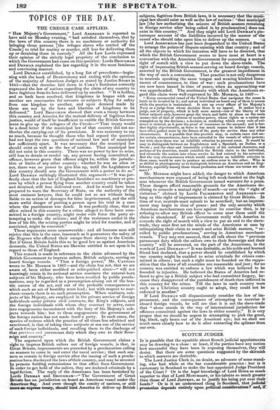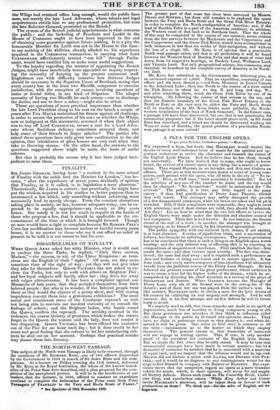SCOTCH JUDGES.
IT is possible that the squabble about Scotch judicial appointments may be drawing to a close : at least, if the parties have any notion how successful they have been in exposing themselves, they will desist. But there are some questions suggested by the skirmish to which answers are desirable.
The Lord Justice Clerk is, no doubt, an advocate of some stand- ing, who had while at the bar considerable practice : but is it customary in Scotland to make the last-appointed Judge President of the Court ? Or is the legal knowledge of Lord Hors so much superior to that of Lord MoacaiErF, or his talents so much greater than those of Lord JEFFREY, as to justify his being put over their heeds? Or is it an understood thing in Scotland, that judicial promotion depends entirely upon political considerations ? and, if the Whigs had retained office long enough, would the public have seen, not merely the late Lord Advocate, whose talents and legal acquirements entitle him to any professional promotion, but even the late Solicitor-General, promoted to the Bench ? The system of the Scotch judicial appointments is what concerns the public ; and the bickering of Peachum and Lockit in the House of Commons ought to have been improved to the end of obtaining some guarantee against future jobbing. It is a pity the honourable Member for Leith was not in the House at the time : to say nothing of his abilities, already alluded to, his experience acquired in the Conanousa transaction, in carrying what Lord CUNINGHAME affectionately termed "our bill" through Parlia- ment, would have enabled him to make some useful suggestions.
To the inquiry regarding the manner of appointing the Scotch Judges, might have beneficially been appended an inquiry respect- ing the necessity of keeping up the present numerous staff. Englishmen can with difficulty conceive how thirteen Judges should be necessary in the Supreme Court of Scotland, seeing that every county has at the least two Sheriffs, competent to exercise jurisdiction, with the exception of causes involving questions of status or feudal titles, in any kind of litigation. The alleged necessity of having two Sheriffs for each county—one to discharge the duties, and one to draw a salary—might also be sifted.
These are questions of more practical importance than whether the late Lord President clung to his seat on the bench a couple of years after Fox Manus maintained his fitness against all challenge, in order to secure the promotion of his son ; or whether the Whigs, now so indignant at this manceuvre, screened it when their object was to buy off Lord Coasnonsz, secure a seat for a Lord Advo- cate whose fastidious delicacy sometimes annoyed them, and help some of their friends to larger salaries ? The parties who raised these questions have only given new confirmation to the old _ opinion, that inhabitants of glass houses are very rash when they take to throwing stones. On the other hand, the answers to the questions suggested above might be made the basis of useful reforms.
But that is probably the reason why it has been judged inex- pedient to raise them.



























 Previous page
Previous page